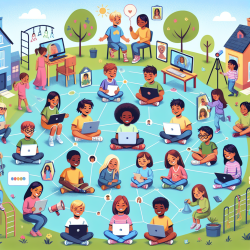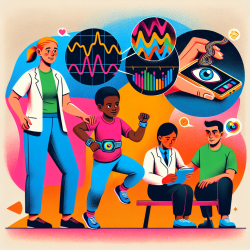The field of online therapy, particularly in special education, is continually evolving. Practitioners are often on the lookout for strategies to enhance their skills and provide the best possible care for their clients. One promising approach to achieving this is through knowledge translation, a method designed to bridge the gap between research and practice.A recent study titled "A blended knowledge translation initiative to improve colorectal cancer staging [ISRCTN56824239]" by Wright et al. offers valuable insights that can be adapted to the realm of online therapy. Although the study focuses on colorectal cancer staging, the principles and strategies it employs can be universally applied to various fields, including special education.
Understanding Knowledge Translation
Knowledge translation involves a systematic approach to transferring research findings into practical applications. It emphasizes the use of evidence-based practices and seeks to overcome barriers that prevent the implementation of these practices in real-world settings.
Key Findings from the Study
The study by Wright et al. implemented a multi-faceted knowledge translation strategy to improve colorectal cancer staging in Ontario. The key components of their approach included:
- Identifying and utilizing opinion leaders.
- Providing formal continuing medical education (CME) sessions.
- Using social marketing principles to influence behavior change.
- Providing toolkits and follow-up materials to reinforce learning.
Applying These Strategies to Online Therapy
Online therapy practitioners can leverage the findings from this study to enhance their practice in several ways:
1. Identifying Opinion Leaders
In the context of online therapy, opinion leaders could be experienced therapists or educators who are respected in the field. These individuals can champion best practices and influence their peers to adopt new techniques.
2. Continuing Education
Regular professional development sessions, similar to the CME sessions in the study, can be organized for online therapists. These sessions can focus on the latest research and evidence-based practices in special education.
3. Social Marketing Principles
Using social marketing principles, such as clear educational objectives and engaging educational materials, can help in promoting behavior change among practitioners. This could involve creating concise, user-friendly resources that emphasize key concepts.
4. Toolkits and Follow-Up
Providing therapists with toolkits that include practical resources and guidelines can aid in the implementation of new practices. Follow-up materials and ongoing support can help reinforce learning and ensure sustained practice change.
Encouraging Further Research
While the strategies outlined above can significantly improve practice, it is also crucial for practitioners to stay engaged with ongoing research. Encouraging therapists to read and reflect on recent studies can foster a culture of continuous improvement.
Conclusion
By adopting a knowledge translation approach, online therapy practitioners in special education can bridge the gap between research and practice. This not only enhances their skills but also ensures that clients receive the highest standard of care.To read the original research paper, please follow this link:
A blended knowledge translation initiative to improve colorectal cancer staging [ISRCTN56824239] 









